Jayapura

Lochmarin
Mon 17 Oct 2016 09:53
02:32.369S 140:42.526E 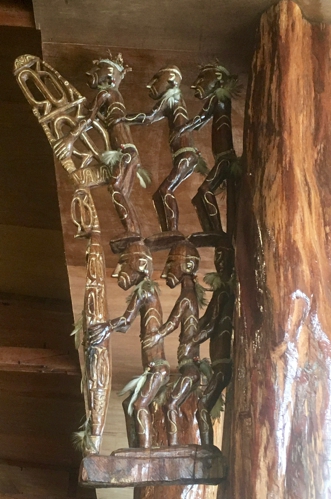 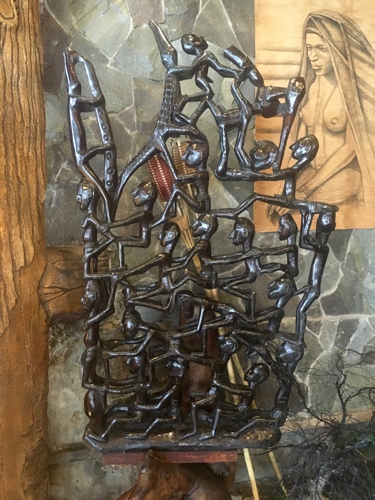 Intricately carved Papuan sculpture. Next comes the noise. Of course there's the continuous roar of the huge generator across the harbour and the background drone of the traffic, punctuated by shrill whistles from the traffic police and the staccato horns of the taxis. Then, on top of that, five times a day comes the Muslim call to prayer, not from just one minaret but from three, all slightly out of phase. Over the week we've come to recognise the voices, some are more harmonious than others. Not to be outdone the Christians don't content themselves with church bells before a service, they play tinny hymns via loudspeaker, at daybreak and again periodically through the day. The muezzin wins that particular competition hands down. Alongside the shore are many restaurants built out on piles. They all advertise "live music", which can range from one chap with a keyboard producing background Muzak to the rather good rock band that played Friday night. The only problem is there's half a dozen restaurants, all with live music, creating a multilayered cacophony that slowly disintegrates into hit and miss karaoke as the night progresses. Mostly miss. After it rains and all the gutters have had a good swish out there's so much rubbish floating by that one could, if one were very light and had good balance, walk from the boat to the shore by stepping from floating plastic to floating plastic. There are fish, it seems, as a few brave fishermen patiently cast their nets. It's the idea of the by/catch that bothers me, imagine having to pull those brown knobbly 'fish' out of your net. We even saw one man swimming with a spear gun. Mind you, you probably need one as defence against the sort of fish that live in this harbour. I hadn't realised Ankh Morpork had a twin town. 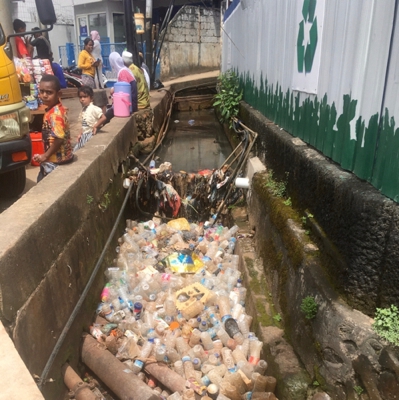 No, not a recycling point, just where the gutter flows underground leaving it’s cargo of plastic behind. We anchored near the Police wharf and left our dinghy with them when we went ashore. I can honestly say that they couldn't have been friendlier or more helpful, taking our painter, helping us up, offering us water and always having time for a few words of greeting. In fact, almost without exception, the people here are wonderfully friendly, smiling and greeting us wherever we went. They are also fascinated by us: white hair, blue eyes. They stare without reserve, nudging companions and pointing so they won't miss out on the spectacle. And when we come to think of it, apart from one ex-pat family in the supermarket, the only other white people we've seen all week were a French couple of back packers (who Phil met first in the Indonesian embassy in Vanimo). 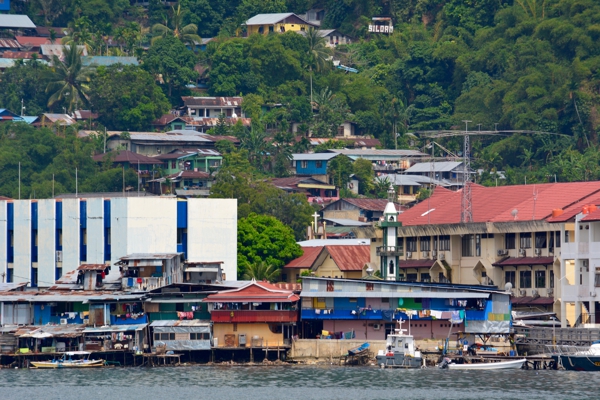 Police wharf on the right. The primary form of transport is the scooter, the secondary is the little mini bus taxi. The scooter is clearly considered a sort of MPV. There's room for plenty of passengers: two behind and another little one in front of the rider. Alternatively, the pillion seat is a perfect flatbed for goods transportation, as well as the footwell, and with the right accessories it can be transformed into a mobile restaurant, a shop or the perfect way to carry 15 full water containers, stacked higher than the riders head. 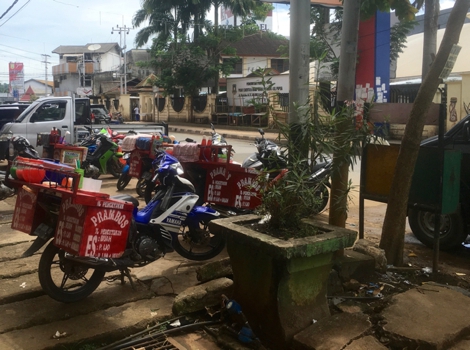 A fleet of snack stalls all ready for the evening. Shopping is good. We drew a blank on new printer cartridges but found a replacement battery for our laptop. There's most kinds of food that you could want - although I decided not to get the brown onions when I reached to check if they were hard and found them covered in cockroaches. The markets in Hamadi are superb and very cheap. Most things are Rp5000 a bunch, that's 30p in sterling. One doesn't need to cook though, as the street food is just brilliant. We had a full meal: grey unknown vegetable soup (delicious!), rice with spicy sauce, omelette, mixed vegetables, strange chewy brown things that look a bit like squared off maggots, and iced water, all for Rp30,000 for the two of us, that's £1.80. In cafes it's not much more expensive. We have no idea what we're ordering so it's all rather random. I go for options on the menu that have a lot of words, the theory being that it may mean it will be a selection of things and I'm bound to like some of them. Having had a couple of meals spoilt by fire filled mouths we've learned to say "Ta pedas”. 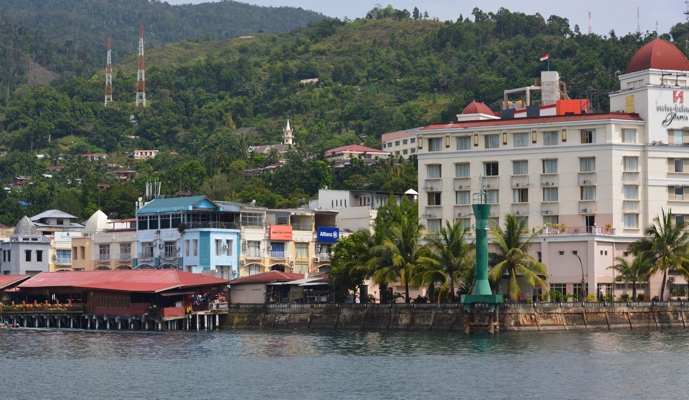 Restaurants on piles on the left. We have spent most of this week checking in and, although we checked out today, we hadn't quite completed the check in. The Harbour Master, Lucky (how cool to be one of the few people in the world to be able to truthfully say "I am Lucky"!), is really helpful and efficient. There was a small problem because our cruising permit (CAIT) had been signed and stamped by the Ministry of Foreign Affairs and the Ministry of Defence but not by the Ministry of Transport. It turns out, due to changes at the start of the year, they don't think they need to sign anymore so refuse to but the other ministries disagree and leave the space for the Ministry of Transport on the form. We were the first yacht checking in this year so the issue hadn't come up before. The police were fine, only about 3/4 of an hour wait and they weren't upset when we declined their request for a receipt free “contribution to administrative costs”. Immigration was a taxi ride away in Entrop, the taxi driver charged us six times the correct fare but apart from that it was quick and painless. Quarantine were hard to get hold of, there's a port office which is either closed or has two or three people lying on rows of chairs with their shoes off watching TV. They arranged for a car to come and take us to the main office, which is way off beyond Entrop, overlooking our anchorage in Humboldt Bay. It's on such a steep hill that the taxis can't get up it. Once we were there they were quick and efficient. But customs. Customs is another story. We went to check in on Tuesday, they took our papers, copied them and told us to go to Quarantine and that they'd come and check the boat at 6pm. They didn't come, but phoned to say they'd come at 9 next day. They didn't come. They said they'd come Wednesday, we stayed on board all day, they didn't come. We got a phone call on Thursday asking us to come to the office. We went, after an hour they photocopied the same papers they'd taken on Tuesday and told us to go again. We asked what was happening, asked them to check, and they came back with 6 forms for us to fill in and said they'd come to the boat at 4. They didn't. By Friday they'd stopped answering the phone when Phil called them. So today we went to check out still having had no paper work from them for checking in and no boat inspection. They told us we didn't need any customs clearance and to go away. We asked to at least have copies of the forms we filled in. Eventually they gave them to us and with that we had to be satisfied. In general every government department seemed to be over staffed. In every one except immigration there were people sitting at desks doing nothing but chilling on their phones, watching videos on their computer or watching TV. But they are very good at uniforms, with plenty of brass badges and trim. Underlying our week here has been the knowledge that we are in Papua, not just anywhere in Indonesia. Amongst the Asian faces the Papuan features we've grown to love smiled out at us. We were able to stop and chat in English/Pisin mix with folks in the parks. Artefacts like drums, grass skirts, penis sheaths and carvings are for sale in "Arts" shops and used to decorate restaurants. Drums, birds of paradise and traditional spears are painted on gate posts and walls. Jayapura is the frontier of Indonesia's progress into Papua, if you look on the map the roads peter out not far South from here. Seeing the enterprising mindset of the Indonesians there will be no going back, just a relentless push forwards to develop. I hope it brings health care and education to the native Papuans, along with more opportunities and some relief from poverty. I hope it doesn't smother the unique way of life that is their inheritance. 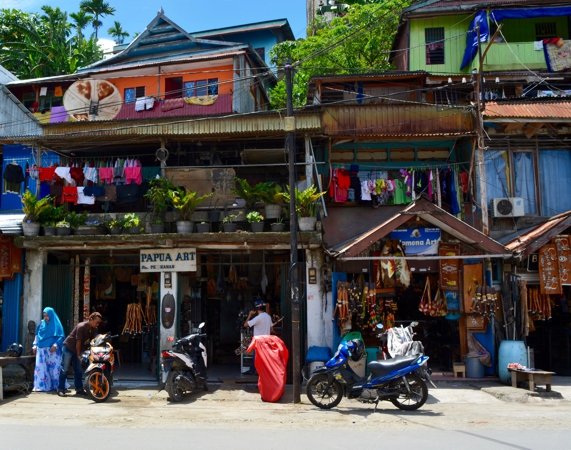 Artefact shops, with penis sheaths dangling in the door ways. 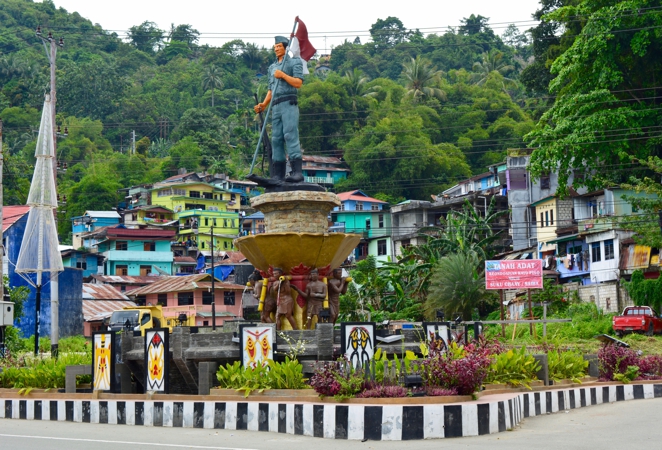 Rather scary orange soldier balanced on top of Papuan villagers. |